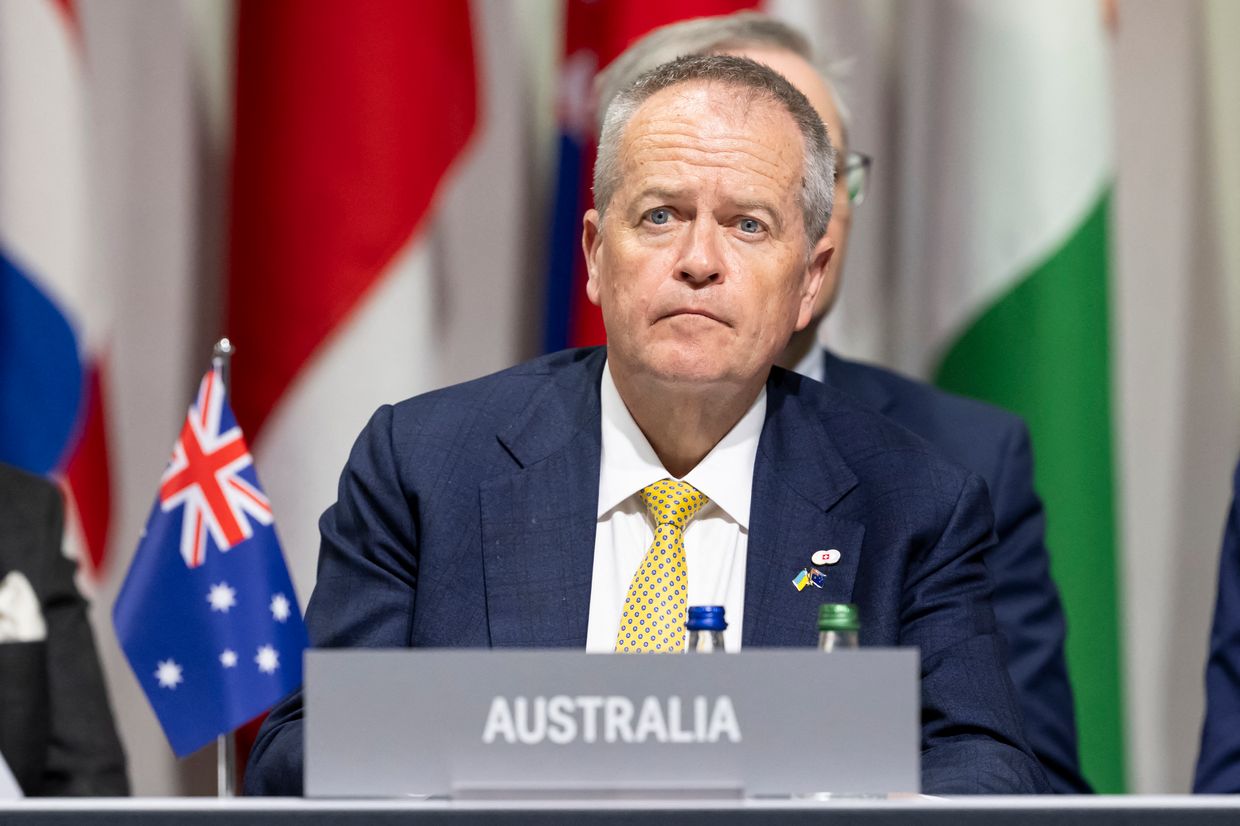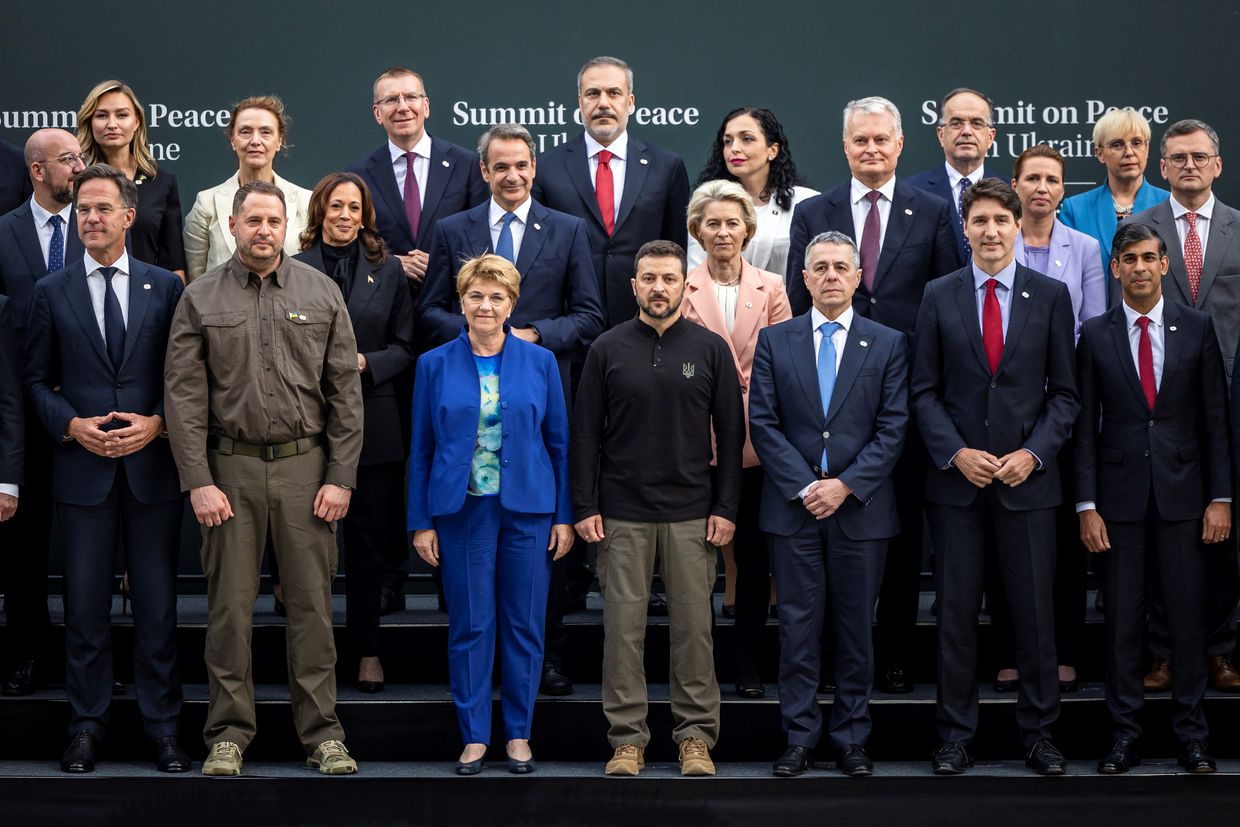Ukraine's peace summit falls short of engaging Global South — can Ukraine expand its coalition?

President Volodymyr Zelensky (C) is welcomed by Switzerland's Ambassador to Ukraine Felix Baumann (L) and Deputy Head of Swiss Protocol Manuel Irman (R) as he arrives at the Zurich airport on June 14, 2024, ahead of the Ukraine Peace Summit in Switzerland. (Michael Buholzer/POOL/AFP via Getty Images)
Ukraine's global peace summit concluded on June 16 with 78 countries and five institutions signing a joint communique so far.
While 92 countries participated in the summit, several key countries declined to ultimately sign the communique. Since the original document was released, three countries—Rwanda, Iraq, and Jordan—have seemingly withdrawn their signatures.
Notably absent from the list of countries that signed the document were India, Indonesia, Brazil, Mexico, and the majority of the Global South. China, a key Russian ally, declined to take part in the summit.
More than half of the communique signatories came from Europe. When counting other key Western allies outside of Europe – the U.S., Canada, and Australia – the disparity is even more stark.
Six South American countries joined the declaration, together with 10 African countries and eight Asian countries signing, including Japan and South Korea, which are firmly in the Western camp.
Antigua and Barbuda, which did not attend the summit, later joined the communique.
More than two years into Russia's full-scale invasion, Ukraine's diplomatic attempts to engage the Global South have largely failed.
Despite significant efforts and a large turnout, the global peace summit remained a largely Western affair that was mostly unsuccessful in its attempt to expand the coalition of Ukraine supporters, said Michael Kugelman, director of the South Asia Institute at the Wilson Center, in written comments to the Kyiv Independent.
The big players – China, India, Brazil
China and India, the two largest countries in the world and the second and third biggest economies, respectively, did not sign the document.
While Beijing has said that it does not support Russia militarily, it remains one of its key allies, providing key financial and diplomatic support. China has also been Moscow's key supplier of dual-use technology.
Getting China to turn on its ally Russia was always a long shot, and China's absence was not a surprise, despite Ukraine's efforts to bring Beijing to the summit.

India's refusal to sign the communique was also not totally unexpected but remained a blow to Ukraine's attempt to court the Global South.
Prime Minister Narendra Modi did not attend, nor did Foreign Minister Subrahmanyam Jaishankar. Instead, India was represented by Pavan Kapoor, India's former ambassador to Russia.
Following the summit, Kapoor said India could not sign the communique because "only those options acceptable to both the parties can lead to abiding peace."
The sentiment was echoed by Brazilian President Lula da Silva and Indonesian President-elect Prabowo Subianto, both of whom declined to participate in the summit and sent officials in their stead, citing Russia's absence as a chief factor.
'A pro-West, anti-Russia affair'
U.S. National Security Advisor Jake Sullivan characterized the talks as a "tremendous success" and said that it demonstrated there was "broad and deep support for a just peace."
But in the Global South, the feeling was largely different. With Russia's unwillingness to join the talks, the achievable outcomes of the summit were always in question.
"Rightly or wrongly, the perception there and in India is that the peace summit was a pro-West and anti-Russia affair," said Kugelman.
Due to this sentiment, Kugelman said there is hesitance in the Global South to be seen as "doing anything that can be perceived as siding too much with one camp."
India, often considered one of the leaders of the developing world, "may be the most prominent proponent of strategic autonomy, but it's actually a policy embraced by much of the Global South."
Even if India were to take the lead and encourage other countries to follow suit, "India itself wouldn't want to be seen as pressuring countries to take a particular stand on sensitive geopolitical issues," Kugelman said.
To a certain extent, there is a historical precedent at work. The Soviet Union expended significant effort to court the Global South and portray itself as a champion of anti-colonialism, and its support for India vis-a-vis its primary geopolitical foe Pakistan, long backed by the U.S., still garners Russia residual goodwill.
Russia remains a strategic partner to India, supplying it with arms and energy—and the latter has only increased since the beginning of Russia's full-scale war against Ukraine and subsequent partial isolation.

Speaking shortly before Foreign Minister Dmytro Kuleba's first-ever visit to India in March 2024, Jaishankar was candid about India's pragmatic approach toward Russia.
"So, tell me, has Russia helped us or harmed us? Has Russia, at crucial moments, contributed or obstructed?" the Indian foreign minister asked rhetorically.
"So, if I do my calculations from my perspective and my experiences, I will get the answer—and the answer in this case is that Russia is a country with which we have always had a positive relationship."
Ukraine's diplomatic effort
Ukraine expended considerable diplomatic effort to try and woo the Global South.
It has used practical arguments—invoking Ukraine's crucial role in supplying much of the developing world with grain, which has been restricted by Russia's war.
President Volodymyr Zelensky has said that Russia is trying to "weaponize" food shortages as a form of blackmail against countries dependent on Ukraine and Russia for grain.
Foreign Minister Kuleba has visited Africa several times since the beginning of the full-scale war as part of a plan to shore up support and argue that Russia's military aggression is ultimately responsible for food shortages on the continent.
Ukraine has also employed moral and geopolitical arguments, aiming to persuade nations that supporting Ukraine is the right thing to do and that allowing Russia to unilaterally change borders with military force would set a dangerous precedent.
Ghana's President Nana Akufo-Addo backed these arguments in a speech at the peace summit, saying that outside of Europe, "Africa has been the greatest victim" of Russia's full-scale war.
Akufo-Addo added that Ghana opposes "great power hegemony and the bullying of small states by big powers. It is in this context that we view and continue to view Russia's invasion and acts of aggression."

Ghana's statement remained an outlier among the Global South. Amid Israel's war against Hamas, which has seen tens of thousands of civilian casualties, and the perceived lack of Western attention to other problems impacting the developing world, there is a sense of hypocrisy from some countries.
The sentiment was directly referenced by South African National Security Advisor Sydney Mufamadi, who represented the country at the peace summit.
Mufamadi criticized Israel's participation in the talks while the war against Hamas is ongoing, saying that "the failure to uniformly and fairly implement international law in all conflict situations globally weakens the normative framework of international accountability and makes the world less safe for all."
There were other bright spots, such as signatures from Peru, Chile, the often Russia-aligned Serbia, and Turkey, which has maintained a careful balance between supporting Ukraine and remaining on good terms with Russia.
But they were exceptions, and the majority of signatories were already in Ukraine's camp before the summit was held. As long as Ukraine is beholden to the West for military support, it will be difficult for it to fundamentally change its dynamic with the Global South, Kugelman said.
Trade between Ukraine and India, compared to that of Russia and India, is illustrative of the inherent disadvantage Ukraine faces in its attempt to shift the needle.
In 2023, estimates of the bilateral trade between Russia and India surpassed $50 billion, while at pre-war levels, trade between Ukraine and India amounted to less than $3.5 billion.
Ultimately, as long as backing Ukraine is portrayed as a binary choice that could damage relations with Russia or China, there is little in concrete terms that Ukraine can offer the Global South.











